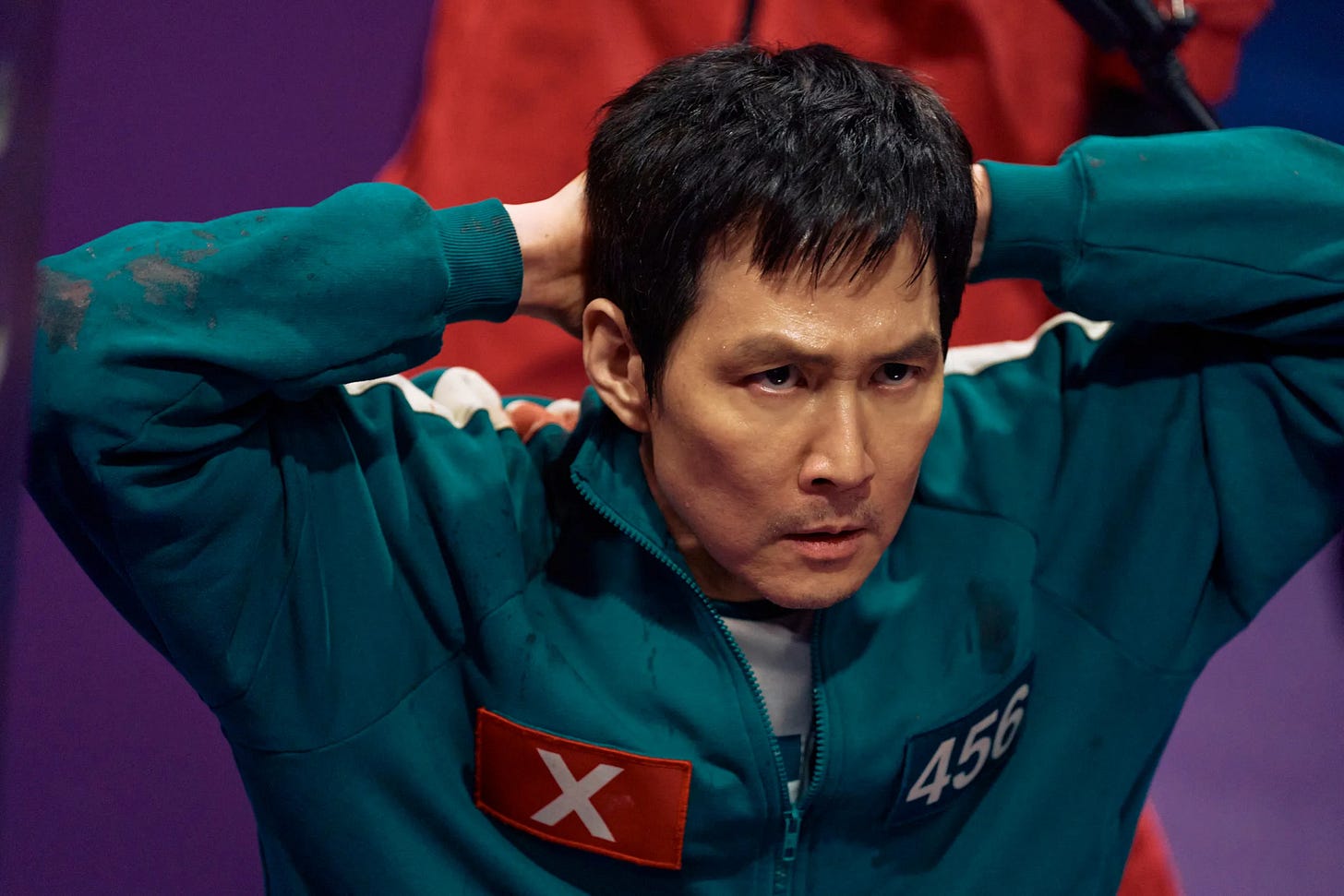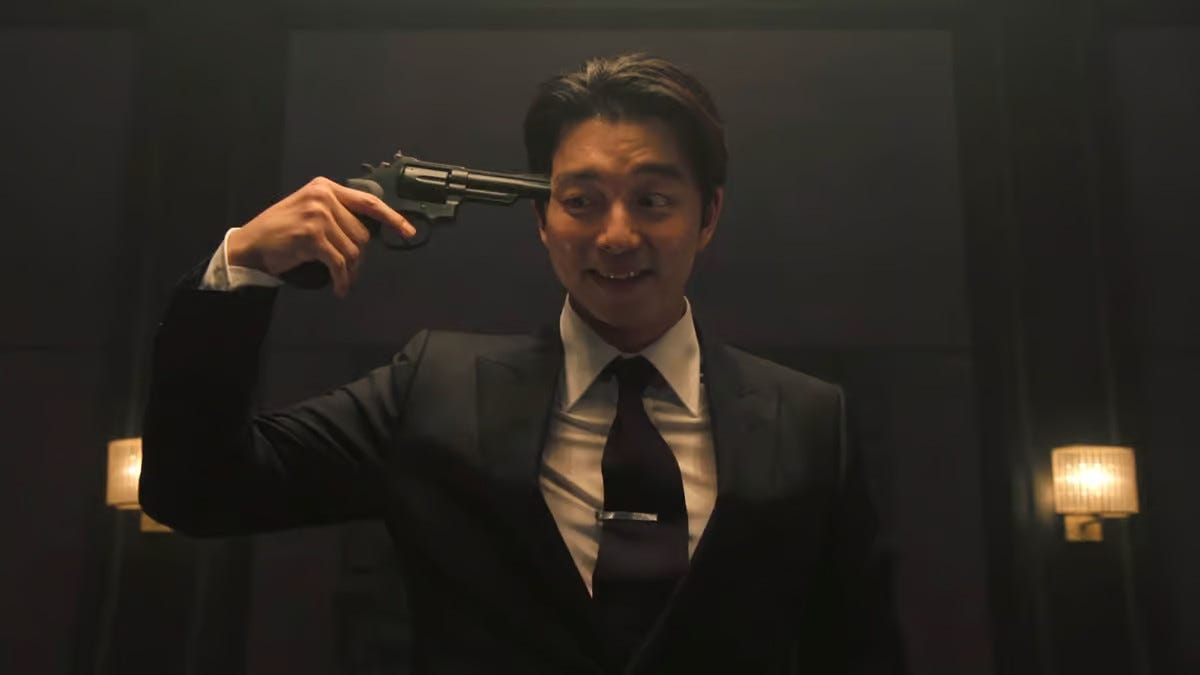Squid Game Season 2: Acing the Sequel
The secret to the second season of everyone’s favorite late-stage capitalism horror is a subtle shift of focus.
NEW STANDARD DISCLAIMER: This newsletter aggressively spoils things.
Sequels—and their serial fiction cousins, second seasons—can be challenging due to the desired balance between giving people more of what they liked the first time around while offering at least some kind of new angle or expanded glimpse into the universe1. This often leaves sequels feeling like retreads, just repeating the plot points of the first story, or like stories from entirely different fictional universes2.
Nailing the balance is tough, and especially difficult for a show like Squid Game, which established a complex and visually distinctive alternate reality3 juxtaposing children’s games with bleak despair and bloody violence4. The first season felt complete despite ending on a bit of a cliffhanger—protagonist Gi-hun (Lee Jung-jae) survived the brutal games and the terrors of his fellow players, and walked away with about $30 million5.
A show like Squid Game, organized as a series of challenges complicated by personalities, is ripe for repetition. And after two episodes of exposition explaining how Gi-hun gets back into the games6, it looks like that’s just what we’ll get, as the first game is exactly the same as the first season. There are some nice changes—a focus on one of the previously faceless guards is exciting—and the game plays out a little differently due to the different characters involved, but it’s still the same game.
After that, though, not only does the show give us some different games, it also shifts its narrative focus slightly, and that’s what makes Season Two sing7.
You Seem to be Struggling

Season 2’s Gi-hun is very different from Season 1’s version. Aside from being a multi-millionaire, he’s driven and focused, intent on destroying the games and exposing the oligarchs that fund it. His plan to kill the Front Man (Lee Byung-hun) quickly fizzles, and his backup plan to have a team of paid mercenaries track him to the secret island where the games take place and invade also goes quickly awry, as the organization running the games is quickly established as one of those uber-competent and all-powerful groups that are always five moves ahead8.
But once Gi-hun finds himself once again fighting for his life in the games, two things subtly change the focus of the show and make this second go-round feel fresh and full of mystery despite our familiarity with the mechanics and setting. One, Gi-hun isn’t here for the money—he’s here to try and save as many lives as he can, to convince people that they shouldn’t even play these demented games. And two, the Front Man infiltrates the players and allies himself with Gi-hun in order to break him. To convince him that humanity is, indeed, trash, and that the people playing the games deserve to die9.
This shift in focus—from survival and the horrors of later-stage capitalism to an invisible battle of wills between too opposing viewpoints—is interesting, and offers a compelling reason to keep watching (beyond the spectacle of these extremely well-staged, exciting, bloody games10). Gi-hun returns with his faith in humanity intact, and there’s a sense that if he can hang onto it no matter what, the Front Man might experience something dramatically worse than death or defeat—he might have to reconsider his whole worldview.
Turning in a Circle as We Dance Along
The big mistake a lot of series and franchises make is simply recreating the initial premise and setup, adding in a few twists or new levels to explore. That’s fine, and as a fan I can get into that as much as anyone else, but it only works to a point: If all Squid Game 2 had to offer was some crazy new games, that would be entertaining11 and it would be fun, but it wouldn’t be very interesting because the underlying mechanic would all be the same.
By introducing a philosophical war between Gi-hun and the Front Man, something more interesting is going on. Everything the Front Man does in his disguise as Player 001 is meant to lead Gi-hun gently to the conclusion that his faith in humanity is misplaced. Since the Front Man won the games himself years ago and was recruited into the organization later, it’s easy to imagine that this is crucial for him—the Front Man has to prove to himself that he was right to despair and join the games. If Gi-hun can’t be broken, it means the Front Man could have held onto his humanity all those years ago12.
It also serves to underscore the manipulations of the games, the way the illusion of free will is offered, the way hints are offered that suggest and imply violent solutions to problems13. Because we can see Player 001’s reactions, and because Gi-hun has seen it before, the fake choices are clearer, much as they are in real life.
Of course, the new games are also pretty thrilling. The Six-Legged Pentathlon and Mingle are spectacular set pieces in the series, and well worth the price admission all by themselves. But it would be just a little hollow if the show hadn’t baked in this new battle of wills between two men.
Do I even need to say that I would be dead within minutes of starting a Squid Game? I have the grace of a horse falling down stairs and the hand-eye coordination of a chair14. When I played Little League my teammates told me my position was Left Out. I once played basketball for two hours and spent the afternoon throwing up. I ... may need to reassess my level of physical fitness.
NEXT WEEK: Cuckoo suffers from non-repetition.
If you enjoy this newsletter, consider subscribing to my paid fiction Substack, Writing Without Rules: From the Notebook!
This is also what dating is like, isn’t it?
Master of None, I am looking at you.
Sweet baby jebus, I sure hope that’s an alternate reality and not some sort of stealth documentary. Though I admit I would not be surprised if that turned out to be the case.
Which … actually sounds like the games I played as a child, though it’s possible the kids on my block in Jersey City were just assholes.
I can’t even be bothered to write one more 500-word article in exchange for a few hundred bucks, so I would be absolutely terrible at Squid Game. Also: Dead.
For the record, these are long episodes salvaged solely by the cheery presence of the Recruiter, whose death I will mourn forever more.
Speaking of, in this age of endless IP exploitation I am amazed no one has mounted a Squid Game musical yet. The songs write themselves!
This is typically a very boring trope, as omniscient and omnipotent foes leave little chance for surprise, but in this case I’ll allow it because the mercenary army on the boat is composed of the dumbest people alive, so how hard could it be to outwit them? Realism.
Question: If someone were willing to just stipulate that, could that someone just receive $30 million, or would I have to kill a bunch of randos first?
The games sequences are done so well that I kind of want to play them even though they end in the deaths of dozens of people each time.
Especially Mingle, which is such a deviously nightmarish game in the show, and one I would definitely lose because I would have spent all my time alienating everyone with my poor attitude and tendency toward flatuence.
This is why self-reflection is a losing game and I refuse to engage in it. I am awesome and I will not brook any arguments on that point, thankyouverymucho.
Man, forks sure are having a moment in television shows, aren’t they?
Is The Grace of a Horse Falling Down Stairs and The Hand-Eye Coordination of a Chair the title of my memoir? It has a ring to it, don’t you think?






I'm late to the game on this one, but I delayed reading it, waiting for the perfect moment. Thank you for a few minutes of reading pleasure. Footnote 9 was laugh-out-loud. (Not that I think it true, but worthy of consideration for 30 mill.)